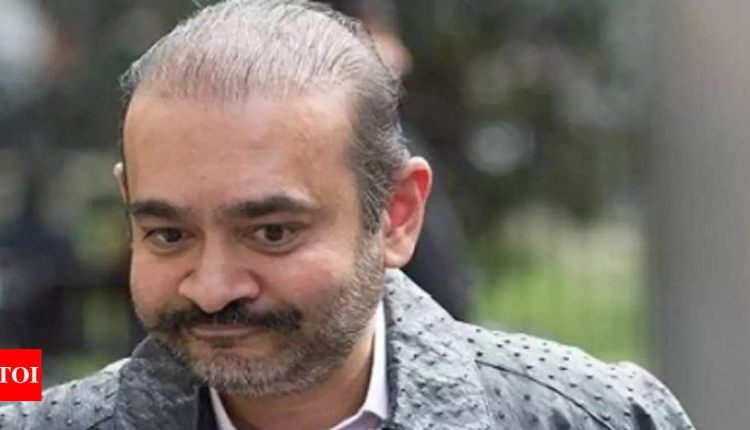Nirav Modi moves for permission to appeal high court extradition decision in UK Supreme Court | India News
LONDON: Billionaire Indian fugitive Nirav Modi has moved the UK high court to obtain permission to appeal its decision to allow his extradition to India in the UK Supreme Court.
On Wednesday the administrative court of the high court confirmed to TOI that Nirav has submitted an application requesting permission to appeal the high court decision dismissing his appeal and that he has also requested the high court to certify points of law of general public importance. The latter is the most important as without a point of law being certified, Nirav cannot appeal to the Supreme Court.
The Indian authorities now need to respond to his application and then the application will be referred to the judges.
A decision is likely to take place on paper, without an oral hearing, and a pronouncement is expected within a month.
On November 9, the administrative court of the high court had dismissed Nirav’s appeal against the lower court’s decision to extradite him to India. The 51-year-old, who is still in Wandsworth jail, had 14 days from November 9 to lodge an application at the high court seeking leave to appeal that decision and get a point of law of general public importance that came up in that case certified.
If the court does certify a point of law but refuses permission to appeal, he has 14 days from that date to apply for leave to appeal directly in the supreme court. If the high court does not certify a point of law, then the supreme court has no jurisdiction and he must be extradited within 28 days of the decision. Liquor tycoon Vijay Mallya, who also lives in London, failed to get any points of law of public importance certified in his case so the SC could not hear his case.
Nirav’s only option left then would be to approach the European Court of Human Rights in Strasbourg for an emergency injunction to prevent his removal to India on human rights grounds. Such injunctions are notoriously difficult to get. Cricket bookie Sanjeev Chawla failed to get such an injunction and was escorted back to Delhi soon afterwards.
The point of law which Nirav is seeking the Supreme Court to consider is, TOI has learnt, the Turner proposition. The current test for whether it is oppressive or unjust to extradite someone (known as Section 91) was established in case law, namely Turner vs Govt of the USA 2012. The Turner test holds that to be considered oppressive, the mental condition of the person being extradited must be such that “it removes his or her capacity to resist the impulse to commit suicide”. Nirav’s lawyer, Edward Fitzgerald KC, argued throughout Nirav’s appeal hearing that the Turner test is the wrong test and needs to be rewritten.
The Indian authorities are trying to extradite Nirav from the UK to India to face charges of defrauding Punjab National Bank of over £700 million (Rs 7,000 crore), money laundering, and destroying evidence and intimidating witnesses.
On Wednesday the administrative court of the high court confirmed to TOI that Nirav has submitted an application requesting permission to appeal the high court decision dismissing his appeal and that he has also requested the high court to certify points of law of general public importance. The latter is the most important as without a point of law being certified, Nirav cannot appeal to the Supreme Court.
The Indian authorities now need to respond to his application and then the application will be referred to the judges.
A decision is likely to take place on paper, without an oral hearing, and a pronouncement is expected within a month.
On November 9, the administrative court of the high court had dismissed Nirav’s appeal against the lower court’s decision to extradite him to India. The 51-year-old, who is still in Wandsworth jail, had 14 days from November 9 to lodge an application at the high court seeking leave to appeal that decision and get a point of law of general public importance that came up in that case certified.
If the court does certify a point of law but refuses permission to appeal, he has 14 days from that date to apply for leave to appeal directly in the supreme court. If the high court does not certify a point of law, then the supreme court has no jurisdiction and he must be extradited within 28 days of the decision. Liquor tycoon Vijay Mallya, who also lives in London, failed to get any points of law of public importance certified in his case so the SC could not hear his case.
Nirav’s only option left then would be to approach the European Court of Human Rights in Strasbourg for an emergency injunction to prevent his removal to India on human rights grounds. Such injunctions are notoriously difficult to get. Cricket bookie Sanjeev Chawla failed to get such an injunction and was escorted back to Delhi soon afterwards.
The point of law which Nirav is seeking the Supreme Court to consider is, TOI has learnt, the Turner proposition. The current test for whether it is oppressive or unjust to extradite someone (known as Section 91) was established in case law, namely Turner vs Govt of the USA 2012. The Turner test holds that to be considered oppressive, the mental condition of the person being extradited must be such that “it removes his or her capacity to resist the impulse to commit suicide”. Nirav’s lawyer, Edward Fitzgerald KC, argued throughout Nirav’s appeal hearing that the Turner test is the wrong test and needs to be rewritten.
The Indian authorities are trying to extradite Nirav from the UK to India to face charges of defrauding Punjab National Bank of over £700 million (Rs 7,000 crore), money laundering, and destroying evidence and intimidating witnesses.


